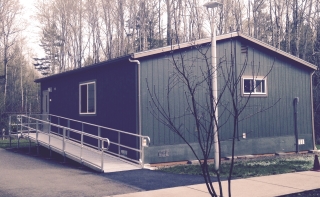|
Subscribe / Renew |
|
|
Contact Us |
|
| ► Subscribe to our Free Weekly Newsletter | |
| home | Welcome, sign in or click here to subscribe. | login |
Construction
| |
April 21, 2015
Modular builder Aries expands to the West
Journal Construction Editor
When Kim Neill got into modular construction in 1978 architects didn't embrace the industry, he said.
But attitudes have changed in the past decade thanks to advances in design and construction that put modular construction on the same level as traditional site-built structures, according to Neill.
Those changes are one of the reasons why Aries Building Systems is expanding in the West.
Neill, who has worked in the local modular building industry for a number of years, joined Aries last fall to open the Pacific Northwest Major Projects Group out of Bellevue.
The group has five other members: senior account managers Steve Yantzer in Bellevue, Greg Pfeiffer in Vancouver and Breton Betz in Colorado; account manager Sam Dragan in Colorado; and administrative manager Mary Grim in Bend, Oregon.
Neill said he will grow the group throughout the West.
Houston-based Aries provides modular buildings for workforce housing, education, government, healthcare, commercial, multifamily and industrial projects. In the West, it is focusing on permanent buildings for education, healthcare and government; and temporary buildings for construction jobsites. Temporary buildings make up about 20 percent of the local group's business.
Neill said Aries is a single source for procurement, site design and development, manufacturing and installation of modular buildings.
“Our industry only has 3 to 5 percent of the market that we are pursuing,” he said. “I would like to see us in the next five to 10 years be around the 10 percent mark.”
Aries has about 10 projects in Washington in progress or under contract valued at about $6 million.
Last month Aries installed a new portable at Cordata Elementary School for the Bellingham School District. Neill said the portable opened last month, just 45 days after the district first contacted Aries about needing extra space for a new program.
“Expanding companies often need customized space quickly, which is why modular buildings can be so attractive,” Neill said. “The time from design to occupancy can be 50 percent quicker than standard construction, and it's certainly more cost effective.”
Aries has a 60,000-square-foot factory in Troy, Texas, but none in the West.
Neill said they are contracting with several third-party factories in the West: Whitley Evergreen in Marysville; Blazer Inc. in Salem, Oregon; and Advanced Modular in Salt Lake City. He said Aries has no plans at this time to open a factory in Washington.
Modular buildings have to adhere to the same building codes as site-built structures, but have the advantage of being constructed in a controlled environment under more supervision, Neill said. At the jobsite, the assembly process is highly streamlined, he added.
Modular is getting additional attention as more projects are being built on tight urban sites.
Neill said modular buildings have less impact on urban sites because as much as 80 percent of the construction is done in a factory, and site work can progress as modular components are made off-site.
There are environmental benefits, too. Laborers working in factories don't have to commute to traffic-laden urban construction sites, there is less construction waste in a factory and recycling is easier, according to Neill.
“In our method of construction you have to do better planning and that cuts down on things like change orders,” he said. “The quality of the product is superior to most construction I know of.”
Benjamin Minnick can be
reached by email or by phone
at (206) 622-8272.



